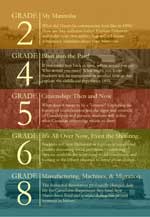 Program Description
Program DescriptionThe community of Manitoba has changed significantly overtime. What did that community look like in 1895? Who lived here? What were their lives like? When people look back at 2011, what would you want them to know about your life? Your community? Come explore a house frozen in time and make your own artifact to tell the future community members about your Manitoba.
To provide students with the opportunity to better understand the heritage and culture of Manitoba through experiential learning in an immersive setting. To support students’ understanding of words like “artifact,” “heritage,” “culture,” and “community.” To help students describe and define what being a part of the community of Manitoba means to them. To teach students about important historical figures in their community.
2.1.3
Stories of the Past2.1.4
Culture and Heritage2.1.5
Personal IdentityKH-025 Relate stories of significant events and people in their local community’s past.
KI-006 Identify cultural groups in their local communities.
KI-007 Give examples of factors that shape who they are.
e.g., language, family, community, traditions, gender, where they live...
VH-008 Value personal connections to stories of their community’s past.
KI-010 Identify their heritage and culture.
KI-008 Recognize that stories of their elders, groups, and communities help shape who they are.
KI-009 Describe groups with which they identify.
e.g., cultural, linguistic, community, First Nation...
VI-005 Value their groups and communities.
Component
Time (minutes)
Description
1. Introduction
10
Students will be introduced to the house and the concept of a “museum.”
2. Trunk Activity
15
Students handle authentic objects stored in a trunk and brainstorm what these objects tell us about the lives of the Macdonald family.
3. Tour
25
Students explore the house, comparing and contrasting it to their own home.
4. Time Capsule Activity
25
Students create their own trunk to fill with objects they think will tell future generations about who they are and what life in Manitoba was like for them.
5. Conclusion
10
The major points of the day are discussed and any final questions are answered.
Page revised: 19 February 2012